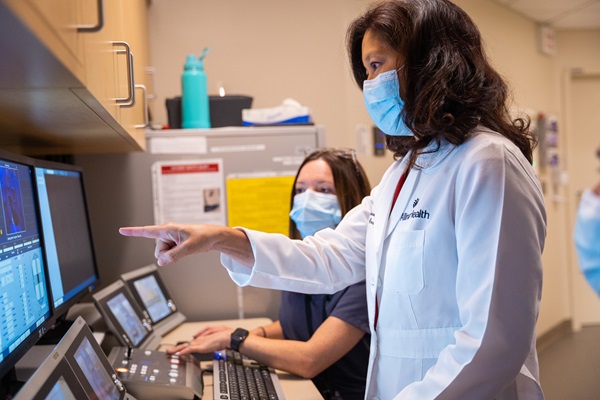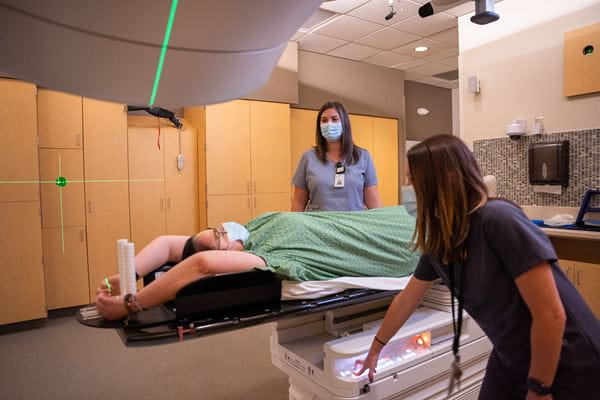
Connect your patients to clinical trials in radiation therapy at AHCI
Patients throughout Minnesota and western Wisconsin have access to the latest radiation oncology therapies at Allina Health Cancer Institute (AHCI). We conduct clinical research trials at our two radiation oncology centers, one at Abbott Northwestern Hospital in Minneapolis and the other at United Hospital in St. Paul.
In these studies, our clinical researchers are investigating new and improved therapeutics and related procedures in radiation oncology. If eligible, patients can receive these treatments before they are widely available.
Why entrust your patients to the radiation therapy team at Allina Health Cancer Institute

At AHCI, our radiation therapy team has years of fellowship training and experience in clinical care and research. With highly skilled doctors in every specialty of radiation oncology, our team includes radiation oncologists, medical physicists, dosimetrists, radiation therapists and oncology-certified nurses.
Our team is credentialed to conduct various types of clinical trials, research studies and protocols in radiation therapy for a wide range of cancer types. We have several protocols specific to Allina Health, and we also offer access to trials through the Metro-Minnesota Community Oncology Research Consortium (MMCORC).
Opportunities for patients: clinical trials at Allina Health Cancer Institute
Currently, our team is involved in several cancer radiation trials and brain radiation trials:
Radiation therapy combined with a medical device
In collaboration with the Givens Brain Tumor Center at Abbott Northwestern Hospital in Minneapolis, our team is participating in the TRIDENT trial. This phase 3 trial is testing the potential survival benefit of initiating Optune® concurrently with radiation therapy in patients with newly diagnosed glioblastoma (GBM).
Optune is a noninvasive medical device, currently approved as antimitotic treatment for GBM, that delivers tumor-treating fields (TTFields) to tumors. TTFields are electric fields that continuously and selectively disrupt cancer cell division in solid tumors.
Surgically implanted radiation therapy for brain tumors
Our team is working with Allina Health neurosurgery colleagues in a study on GammaTile, which is surgically targeted radiation therapy (STaRT). Currently approved for patients with operable brain tumors, GammaTiles are collagen tiles with embedded radiation sources.
Neurosurgeons place the GammaTile at the tumor site immediately after tumor resection to provide immediate, intensive-dose radiation. Surgically guided placement of the tile in the operative bed optimizes the therapeutic margin while minimizing the dose to nearby, healthy brain tissue. The bioresorbable tile keeps the radiation source in place as the dose is delivered over several weeks.
Recent developments in radiation therapy and our expectations for the future

In addition to participating in clinical trials, our radiation oncologists and their teams are among the leaders in implementing new advancements. Recent developments and future trends include:
- Hypofractionation: As technology advances and machines can target tumors more precisely, we can reduce the fractionation for many patients. Using larger radiation doses over a shorter time frame means faster treatment regimens for patients. And patients are happy because they have fewer appointments overall and experience fewer side effects.
- Stereotactic radiosurgery for brain metastases: We have been increasingly using SRS to treat brain metastases over the years, and we see continued growth there. Whereas in the past, oncologists treated brain metastases with whole-brain radiation, SRS can pinpoint those tumors as they arise.
- More radiopharmaceuticals: These drugs use a certain type of isotope to target particular molecules on cancer cells. A wide range of radiopharmaceuticals is in development, and several administration methods are on the horizon, such as injectable and insertable radiopharmaceuticals.
- Image-guided LINAC technologies: Radiation delivery using imaging guidance, such as PET/CT or MRI, is currently in use in investigational settings. Once these technologies are FDA-approved and covered by Medicare and Medicaid, they will be more widely used.
Partner With Allina Health Cancer Institute: How to Refer Your Patients
We welcome referrals from health care providers across the Twin Cities, western Wisconsin and beyond. Here’s how you can refer a patient to AHCI for cancer care:
Providers within Allina Health can place a consult order within Epic.
Providers from outside Allina Health can refer patients by calling our nearest cancer center:
- AHCI Buffalo: 763-684-7747
- AHCI Cambridge: 763-688-8700
- AHCI Coon Rapids: 763-236-0808
- AHCI Faribault: 507-497-3721
- AHCI Hastings: 651-404-1515
- AHCI Minneapolis: 612-863-4060
- AHCI New Ulm: 507-217-5562
- AHCI River Falls: 715-307-6430
- AHCI St. Paul: 651-241-7800